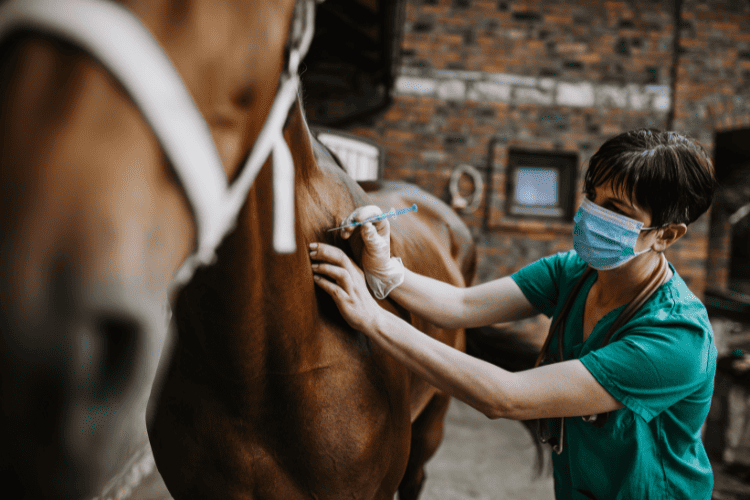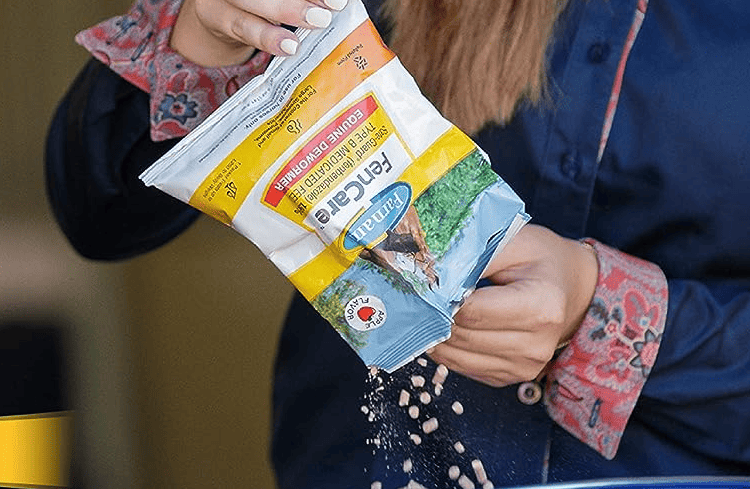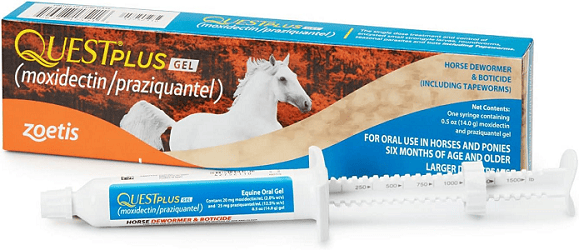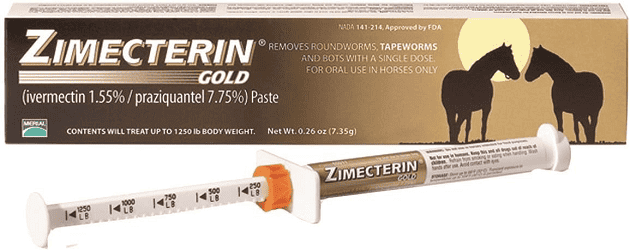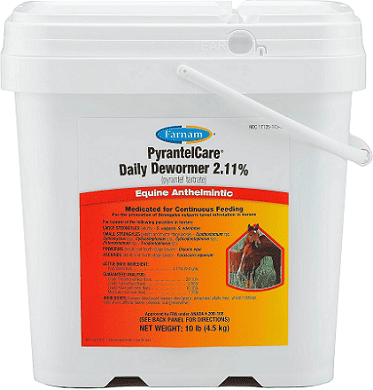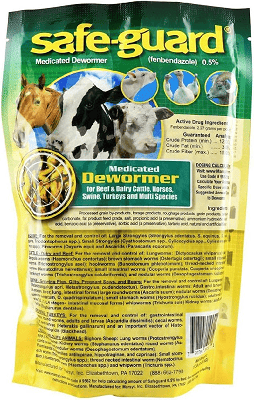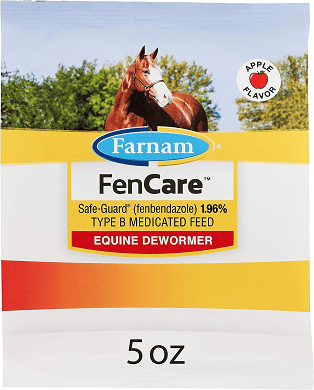- Can Horses Eat Watermelons - September 23, 2023
- How to Get a Horse to Trust You - September 21, 2023
- Best Horse Wormers for Spring Guide - August 10, 2023
- Bottom Line Up Front
- Why Do Horses Get Worms?
- What Worms Do You Treat Horses For in Spring?
- Here's the Best Way to Prevent Worms
- Here are The Things I Consider When Choosing a Horse Wormer for Spring
- The Best Horse Wormers for Spring on The Market
- The Best Horse Worming Pastes for Spring
- #1 - Quest Plus Gel Moxidectin/Praziquantel
- #2 - Zimecterin Gold
- #3 - Equimax Praziquantel/Ivermectin Paste
- The Best Horse Worming Granules for Spring
- #1 - Farnam PyrantelCare Daily
- #2 - SafeGuard Multi Dewormer
- #3 - Farnam Fencare
- FAQs
- The Best Horse Wormers for Spring - My Top Choice and Conclusion
- Resources
Part of my job as a horse care specialist includes creating a regular worming schedule. Parasite management is essential for horse care and includes regularly testing horses for worms and giving them the appropriate treatment.
Horse parasites are becoming resistant to worm treatments, so I give horses specific wormers for each season. This is crucial because different dewormers target different worm species.
So, if you want to know how to keep horses healthy, happy, and parasite-free, take a look at my best horse wormers for spring guide below.
Bottom Line Up Front
When it comes to parasite control, my first choice in spring horse wormers is Equimax from Bimedia. This is the most effective wormer on the market and targets Tapeworm, Ascarids (Roundworms) and Bots, the most common springtime parasites. I love this product because it’s easy to use, and most horses enjoy the taste.
Why Do Horses Get Worms?
Most horses get worms from grazing on contaminated pastures containing worm eggs. The only way to remove parasites from contaminated grass is to break their life cycle by giving a horse a deworming treatment.
Most worm larvae live on grass, and when horses eat them – they invade the body through the digestive system. Here, they mature into worms and migrate to different areas of the body. They also lay eggs in the gut, and horses pass them out in droppings. The eggs develop into larvae from the droppings and contaminate the grass, and the cycle begins again.
It’s normal for horses to have a small amount of internal parasites, and they only become problematic if the numbers become too large. Traditionally, like most owners, I would worm horses at regular intervals throughout the year, but worming horses who don’t need it, causes worms to become resistant to treatment.
These days, things have changed, and before I worm a horse, I do a Fecal Egg Count (FEC) to ensure it needs treatment. An FEC shows how many and the type of worms the horse is “shedding”, so you can treat it correctly.
Worm Symptoms in Horses
The first sign of a worm infestation in horses is loss of condition, such as weight loss and a dull coat. Horses may also be lethargic – with a poor appetite, experience diarrhea or regular bouts of colic, and have a cough or open skin wounds which won’t heal.
If you don’t treat worms, they can wreak havoc on a horse’s body, and in severe cases, they can cause gut damage, long-term health problems, and even death.
What Worms Do You Treat Horses For in Spring?
There are several common equine worms, but the ones I treat in the spring are tapeworms, roundworms, and bots. These species are dormant during the winter and come to life again in the spring.
Below. I’ll tell you more about the internal parasites to treat in spring:
Parasite #1 – Tapeworm
Horses ingest tapeworms by eating infected foraging mites that live in the grass. Tapeworm eggs target the horse’s gut, where they grow and steal nutrients. Tapeworms can grow quite large and cause inflammation or obstruction, which can lead to gastric rupture.
The Tapeworm life cycle is six months long, and I test for them twice a year, in the spring and autumn. Tapeworms don’t appear in an FEC, so I use a Saliva test to detect them. The best wormers for tapeworm are Praziquantel or a high dose of Pyrantel.
Parasite #2 – Roundworm
Roundworms are a type of Ascarid, and horses eat eggs from contaminated grass. The eggs hatch in the stomach, where they enter the bloodstream – and target many areas, including the small intestine, lungs, and liver. If you don’t treat them, roundworms are incredibly destructive.
I use a Pyrantel/Praziquantel combo wormer for ascarids, but Fenbendazole, Ivermectin, and Moxidectin also kill them. Young horses and foals are particularly susceptible to Roundworms and need regular treatments. Roundworms have a three-month life cycle, but their eggs can stay dormant in the earth for years.
Parasite #3 – Bots
Bots appear as tiny yellow eggs on the horse’s neck, chest, and forelegs. Horses eat the eggs when they scratch or groom one another. The eggs stay in the horse’s mouth for three weeks while they develop into larvae.
The larvae migrate to the stomach and attach to the lining, which causes digestive problems and irritation and can sometimes obstruct the digestive system. The best dewormer for bots is Ivermectin or Moxidectin, and I test for and treat bots in the winter and early spring.
Here’s the Best Way to Prevent Worms
Worm prevention includes more than giving horses wormers throughout the year. Parasites are increasingly resistant to wormers, so I also take a holistic approach to prevention.
In addition to giving horses wormers, I remove droppings from the paddock regularly, perform an FEC before giving them treatment, stick to a worming schedule and test and worm new horses as necessary before introducing them to a herd.
Look at my tips below to discover more about the best ways to treat and prevent worms:
Tip #1 – Maintain the Pasture
Pasture management is crucial to prevent worms because this is where horses contract them. I remove droppings from the paddock regularly, ideally several times a week, because removing them prevents eggs from hatching into larvae.
I never overcrowd paddocks and keep mares, foals, and yearlings separate from older horses with more worm resistance. I also rest paddocks for 3 – 6 months, when possible, to disrupt the worm life cycle.
Finally, if I feed roughage in the paddock, I use a rack or net to prevent the horse’s mouth from touching the ground and potentially ingesting eggs.
Tip #2 – Perform a Fecal Egg Count
Performing an FEC is crucial for worm prevention, and a vet can advise you on how to do it. The test will tell you how many eggs a horse sheds in their droppings, and they are classed as either low, medium or heavy shedders. Low shedders need fewer treatments annually, while heavy shedders need more.
A FEC also tells you which worm species a horse has, meaning you can choose the most effective wormer for the species. However, it won’t show some parasites like tapeworms or encysted small redworm – equines need a blood or saliva test to monitor these.
I always use an FEC because it prevents unnecessary worming and stops parasites from building resistance. It also saves money on buying treatments if a horse doesn’t need them.
Tip #3 – Stick to a Worming Schedule
I make an annual testing and worming schedule for horses and stick to it vigilantly. Unless there is a high shedder in the herd, I test and worm twice annually, in the spring and autumn.
I also note the wormers I use and select different ones the following year. Parasites will become resistant to a brand if you use it continually, so I always alternate.
Heavy-shedding horses, foals and yearlings may need worming up to four times a year. Young horses have little parasite resistance and are more susceptible to worms.
Tip #4 – Test and Worm New Horses
Before introducing a new horse to a herd, I quarantine it and do an FEC – because if it’s a heavy shedder, it will contaminate the pasture and other herd members. I treat the horse with wormer according to its test result and confine it for 48 hours to let the treatment take effect.
Here are The Things I Consider When Choosing a Horse Wormer for Spring
The first thing I check when choosing a horse wormer is the ingredients – and I select ones that target the parasite I’m trying to control. I also consider the brand, the product type, and the horse’s size.
I’ll tell you more about these factors below:
Factor 1# – The Ingredients
There are many horse wormer ingredients, but unless you’re a scientist, it’s easy to be overwhelmed by the complicated chemical terminology. To simplify it, I’ve listed the main ingredients to look out for and which parasite they target:
- Fenbendazole – Roundworm
- Ivermectin – Roundworm and Bots
- Praziquantel – Tapeworm
- Pyrantel – Roundworm
- Moxidectin – Roundworm and Bots
Most wormers contain a combination of the above ingredients to target a larger spectrum of worm species. If you want to treat for tapeworm, you must choose a wormer with Praziquantel.
Factor #2 – The Brand
I always choose veterinary-approved, trusted brands such as Equimax or Quest. These are popular in the equestrian world, and I know they are safe and effective. I avoid buying cheap brands which sound unfamiliar because there’s no guarantee they work.
Factor #3 – The Type
Horse wormers usually come as a gel or paste in a plastic syringe or as granules or pellets. Syringe wormers are the most common types, but not all horses like having them in their mouth, so if I need to worm a fussy horse, I opt for granules.
Let’s take a closer look at the different types of wormers:
#1 – Gel/Paste – Paste wormers come in a plastic syringe, which you put in the back of your horse’s mouth, and squeeze the paste into its throat. Gel wormers are the most effective type because they contain more active ingredients and target a broader spectrum of parasites. The downside to gel wormers is that they can be messy. Some horses will spit them out, and if they do, there’s a risk they won’t get the correct dose.
#2 – Granular/pellets – Granule and pellet wormers go directly into a horse’s hard food and are perfect for horses who won’t take a worming syringe. The downside to granular wormers is that they don’t target many species and are less potent than gel wormers.
#4 – Horse size
I always weigh horses before worming them on a loading scale or with a weight tape. Most horse wormers are suitable for horses up to 1300kg, so unless I have an extra large horse, such as a draft type, one wormer is usually enough. If a horse weighs more than the suggested weight limit, I buy two wormers, and for small ponies, sometimes one syringe is enough for two doses.
#5 – The Quantity
I work with horses, and usually, when I buy wormers, I buy them in bulk, so I always look for multi-buy deals. Usually, you can get a discount if you buy more than six wormers – and the more you buy, the bigger the discount.
If you only have one horse, you should buy individual wormers each time because it’s good to alternate brands, and if you bulk-buy, they will probably expire before you use them. If you keep horses in a public barn, you can group with other owners to buy wormers and get a bulk buy discount.
The Best Horse Wormers for Spring on The Market
Buying horse wormers can be confusing because there are many on the market, and they all have different active ingredients. So, to save you the trouble of trawling through the internet and deciphering complex chemical ingredients, I’ve listed the best horse wormers for spring below.
I chose the wormers on this list because they are from trusted, well-reputed equine brands – and because they all target the common parasites that occur in the spring.
The Best Horse Worming Pastes for Spring
#1 – Quest Plus Gel Moxidectin/Praziquantel
Quest Plus Gel with Moxidectin and Praziquantel is a broad-spectrum dewormer and targets most parasites, including tape and roundworms, making it ideal for spring. It’s safe for breeding stallions, pregnant or nursing mares and foals over six months old, and covers horses weighing up to 1500 lb.
Zoetis is a trusted equestrian company that has been producing animal care products for over 70 years – and have a solid reputation in horse dewormers. I love this wormer because it comes with a patented, sure dial syringe, so it’s easy to give horses a precise dose, and the gel dissolves easily on the tongue.
Pros
- Good for roundworms, tapeworms and bots.
- Suitable for all horses
- Dissolves easily
Cons
- Not all horses enjoy the taste.
#2 – Zimecterin Gold
Zimecterin Gold from Meriel is perfect for spring because the main active ingredients are Ivermectin and Praziquantel – so it targets tapeworms, roundworms and bots. The product is FDA-approved and suitable for all horses weighing up to 1250 lb and foals over two months old.
I love this wormer because it’s highly effective and targets 61 parasite species, and many vets recommend it. I also like the easy-to-use weight marking system on the syringe, and most horses don’t mind the taste.
Pros
- Most horses find it palatable
- It kills roundworms, tapeworms and bots
Cons
- There are some reports of allergic reactions in horses
#3 – Equimax Praziquantel/Ivermectin Paste
The Equimax dewormer from Bimedia is my top choice in spring horse dewormer because it’s palatable, easy to use and suitable for all horses, including pregnant mares, breeding stallions and foals over four weeks old. The active ingredients are Ivermectin and Praziquantel – so it’s perfect for all spring parasites.
I love using this product because it’s easy to administer – most horses enjoy the apple-flavored gel. Equimax is one of the most expensive dewormers on the market but is also one of the most effective and backed by many positive customer reviews. One syringe covers horses weighing up to 1320 lb.
Pros
- Highly effective against all spring parasites
- It’s apple-flavored, and most horses enjoy the taste
Cons
- One of the most expensive wormers
- The paste is loose and easy for horses to spit out
The Best Horse Worming Granules for Spring
#1 – Farnam PyrantelCare Daily
Farnam is a trusted equestrian brand, and the PyrantelCare Daily horse wormer is ideal for parasite prevention in the spring. The main ingredient is Pyrantel which kills roundworms and 30 other parasite species but doesn’t kill tapeworms or bots.
PyrantelCare Daily is different from most wormers because it provides continuous protection. Instead of giving horses a one-off dose, you add a scoop of pellets to their daily food. Most horses find it tasty, and it’s the perfect alternative for horses who don’t like gel.
Pros
- It’s palatable
- It’s suitable for all horses
Cons
- It doesn’t defend against bots or roundworms
#2 – SafeGuard Multi Dewormer
The SafeGuard Multi Dewormer pellets are a fantastic alternative to gel, and the main ingredient is Fenbendazole which targets many parasites, including roundworms. It’s a multi-species wormer, suitable for many farm animals, including chickens, cows and horses.
I love this dewormer because it’s easy to use, super effective against roundworms and good value for money. A 1lb bag of SafeGuard will cover up to 1000 lb in body weight. Horses also enjoy the taste, so it’s ideal for horses who want to take a syringe.
Pros
- It’s palatable
- It’s easy to use
Cons
- It doesn’t have a measuring scoop
- It doesn’t kill bots or tapeworms
#3 – Farnam Fencare
Farnam Fencare is an apple-flavored granular dewormer which contains Fenbendazole, so it’s effective against roundworms and several other species, but not tapeworm and bots. It’s suitable for all horses and is easy to administer because you simply add it to a horse’s hard food.
I love Farnam products because they are high quality, safe and effective, and Fencare is my wormer of choice for horses who won’t take a gel syringe. The dosage of this dewormer varies for different worm species, but for roundworms, a 5oz bag of pellets covers a 600 lb horse.
Pros
- It’s palatable
- It’s easy to use
Cons
- It doesn’t kill bots or tapeworm
FAQs
Answer: It’s easy to worm a horse too much, and the problem with overworming is that it promotes parasite resistance. To prevent overworming, I always do a Faecal Egg Count (FEC) before giving a horse a wormer. Horses with a low egg count don’t necessarily need a treatment.
Answer: The best months for worming horses are March to May and September to November. Parasites are most active in the spring and fall and are less of a problem in extreme temperatures such as high summer and mid-winter.
Answer: Most horses need a dewormer twice a year in the spring and fall. But each horse and pasture is different, so the best way to find out how many times to worm a horse is by doing a Faecal Egg Count (FEC).
An FEC will reveal how many eggs the horse is shedding. Medium shedders usually need two wormers annually, while heavy shedders need more frequent treatments. If horses have a low count, potentially they don’t need a dewormer.
The Best Horse Wormers for Spring – My Top Choice and Conclusion
In my opinion, the best horse wormer for spring is Equimax Ivermectin/Praziquantel paste. I love this dewormer because it’s highly effective and targets all spring parasites. Equimax is a trusted brand and favorite among horse owners and one of the best wormers on the market.
When it comes to worming horses in the spring, I choose dewormers that target common seasonal parasites such as tapeworms, bots and ascarids.
But before giving a horse a wormer, I always do a Faecal Egg Count (FEC) to ensure that the horse needs it and also to discover which parasites I need to target. I never give a horse a dewormer if it doesn’t need one because this encourages parasite resistance.
Resources
- Bazay, C., & Bazay, C. (2023). Internal Parasites in Horses – Types, Symptoms, Treatment & Prevention. Mad Barn USA | Mad Barn – Crazy Good Nutrition. Supplements, Minerals, Vitamins and Nutrition for Horses. Visit Mad Barn to Buy Equine Dietary Products. https://madbarn.com/internal-parasites-in-horses/
- Deworming – Alberta Veterinary Center – Red Deer, AB. (n.d.). https://www.albertavetcenter.ca/deworming.pml#:~:text=ADULT%20HORSES%3A,)%3A%20IVERMECTIN%2FPRAZQUANTEL%20(EQUIMAX)
- Horse deworming schedule | CSU Veterinary Teaching Hospital. (2023, July 25). Veterinary Teaching Hospital. https://vetmedbiosci.colostate.edu/vth/services/equine-field-service/equine-recommended-deworming-schedule/
- Horse worming programmes. (2022, January 24). MSD Animal Health HUB. https://www.msd-animal-health-hub.co.uk/Healthy-Horses/Health/WormingProgrammes
- Phillips, C., & Phillips, C. (2023). Horse & Hound’s essential guide to worms and deworming. Horse & Hound. https://www.horseandhound.co.uk/plus/vet-library/horse-worms-worming-guide-703141#:~:text=The%20life%20cycle%20takes%20around,natural%20movement%20of%20the%20gut.
- Prime, D. (2023). Worming horses in the spring. Vet Help Direct. https://vethelpdirect.com/vetblog/2023/03/18/worming-horses-in-the-spring/
- Spring. (n.d.). https://www.westgatelabs.co.uk/info-zone/seasonal-parasite-control/spring/
- User, S. (2021). Equimax Horse – About EQUiMAX. www.equimaxhorse.com. https://www.equimaxhorse.com/about-equimax#benefits


